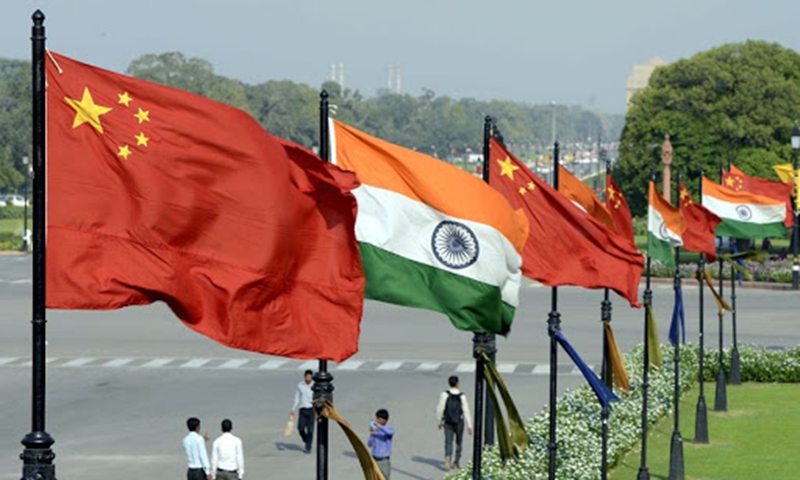Indian hawks, biased media, right-wing political groups should stay rational amid China-India border clash
By GT staff reporters Source:Globaltimes.cn Published: 2020/6/18 2:01:16

Photo: Xinhua
The clash between China and India on the border that reportedly led to the deaths of 20 Indian soldiers has reignited anti-China sentiment in India and a wave of "de-Sinicization" among Indian citizens. Some of India's hawkish politicians and media have also hyped up the conflict.
Indian Punjab Chief Minister Amarinder Singh said on Tuesday that "It is time now for the government of India to take some stringent measures. Each sign of weakness on our part makes the Chinese reaction more belligerent. I join the nation in paying tribute to our brave martyrs. The nation stands with you in your hour of grief," India media reported.
Right-wing media The Pioneer published an opinion piece on Wednesday that claimed China has gruesome nature and kept relentless baiting and provocation.
India's ruling Bharatiya Janata Party explicitly identified China and Pakistan as the biggest external threats to its national interests in its Hindi and English versions of its party cadre training manual in the year of 2018, media reported.
What makes China an imaginary enemy in the eyes of Indians? India's hawkish anti-China politicians and media seem to have played an important role.
Bharat Karnad who is a former member of the National Security Advisory Board of India's National Security Council, published two articles in May criticizing Modi government of not investing enough to make India self-reliant in defense and its handling of the Line of Actual Control (LAC) standoff only showed India's "acute timidity" and encouraged China to be more obstreperous.
Local media also plays a role in "China-bashing" campaign as the Global Times found that some news programs of Indian local TV channels (either in English or Hindi) often called the COVID-19 "Chinese virus" or "Wuhan virus," though most of local mainstream English-language newspaper used neutral and scientific terms in describing the virus.
The prejudiced media agenda to some extent influences Indian people's attitudes toward China as an online survey by Takshashila Institution, an independent think tank in India, showed that 67 percent of the 1,299 respondents believed that China was responsible for the COVID-19 outbreak, and more than a half didn't think terms like "Chinese virus" or "Wuhan virus" were racist or stigmatized.
Some right-wing political groups, such as "National Volunteer Organization," or Rashtriya Swayamsevak Sangh (RSS) in Hindu language, are frequently seen behind these high waves of anti-China sentiment. RSS affiliate Swadeshi Jagran Manch (SJM), which handles economic issues, has called for a boycott of Chinese products and firms amid the latest face-off.
SJM also organized a protest against China on Wednesday. SJM co-convener Ashwani Mahajan had issued a statement, claiming that China should be responsible for the coronavirus pandemic and the unemployment as well as other economic losses worldwide.
RSS and SJM were discontent with India government's "Self-Reliance" strategy that Indian Prime Minister Narendra Modi raised when he delivered a national address. Indian government has said that the strategy is not targeting any specific country but SJM has been pressuring the government to ban a Chinese firm from government tenders for Delhi-Meerut Regional Rapid Transit System project.
The ban is a tribute to soldiers died in the clashes, Mahajan said.
"India also sees China as a backer of recent border disputes with Nepal and Pakistan. So anti-China sentiment has been stronger of late," Long Xingchun, a senior research fellow with the Academy of Regional and Global Governance at Beijing Foreign Studies University and president of the Chengdu Institute of World Affairs, told the Global Times.
Some Indian policy makers and think tanks have been working together to orchestrate a wave of anti-China sentiment, and they think of China and Sino-Indian relations through a biased US lens, said Long.
However, compared with the remarks in Doklam stand-off period, Indian military and government officials, including its Foreign Ministry, generally did not make any particularly unfriendly or aggressive statements during the conflict, despite the fact that some retired politicians have been pouring inflammatory and even hateful speeches across local media.
As an ancient civilization, India is wise enough to understand China with an independent mentality. It is in the interests of India to understand the real China and make correct and strategic judgments on this basis, said Long.
Posted in: DIPLOMACY